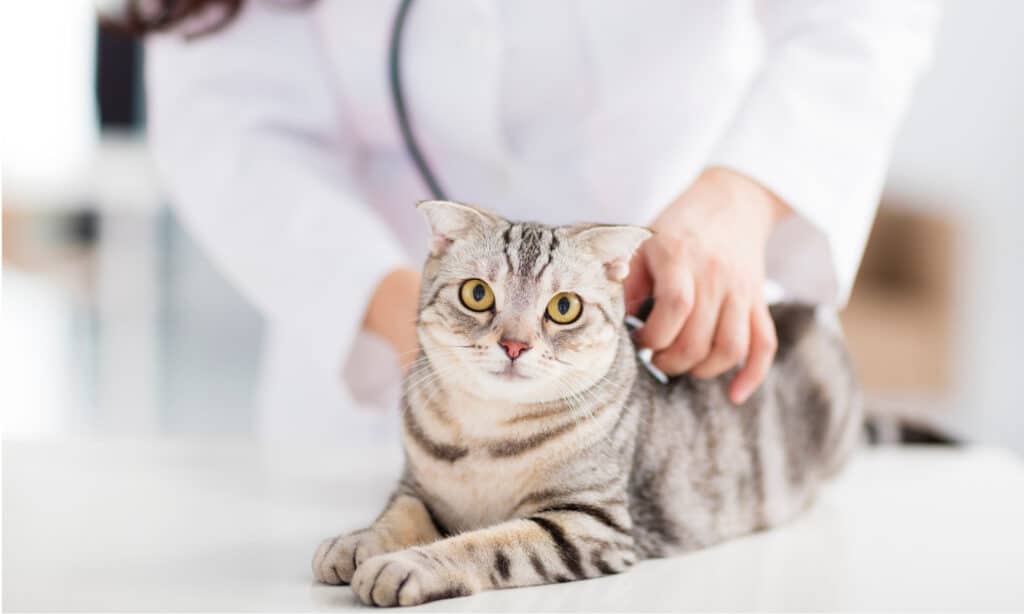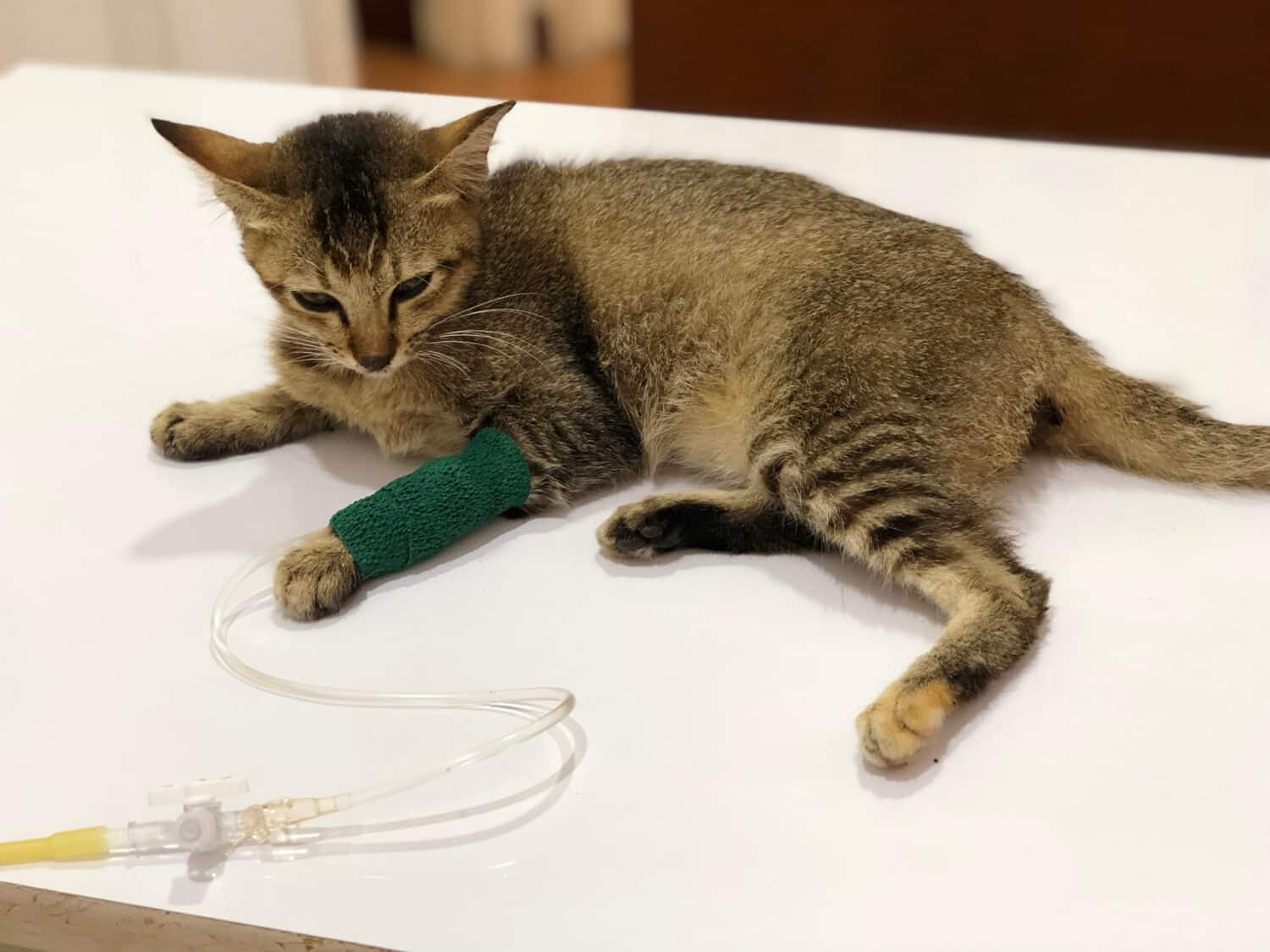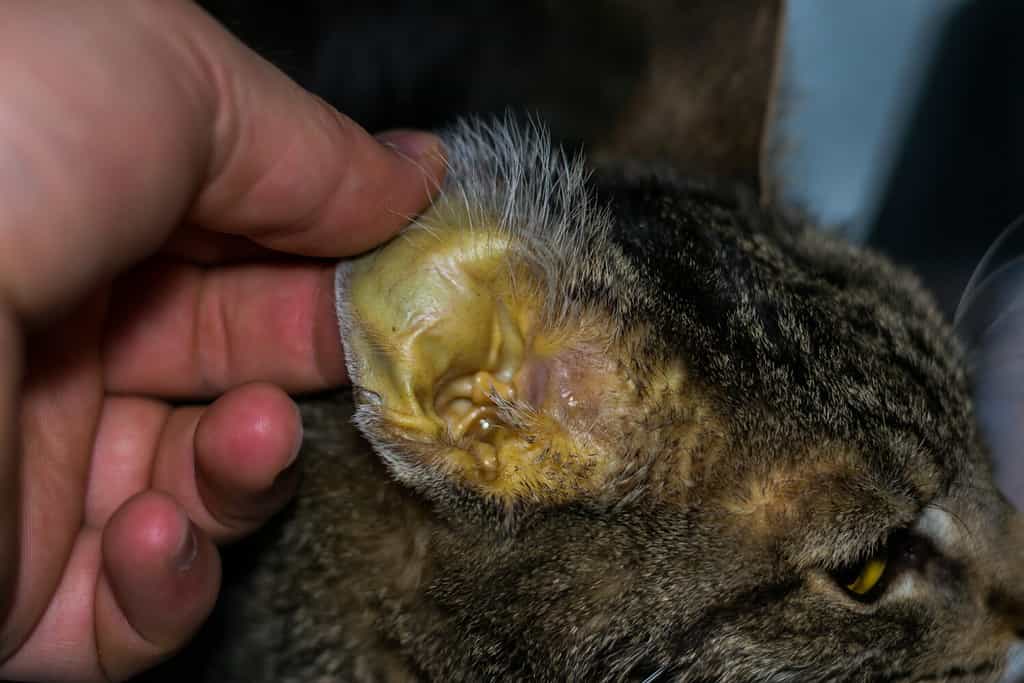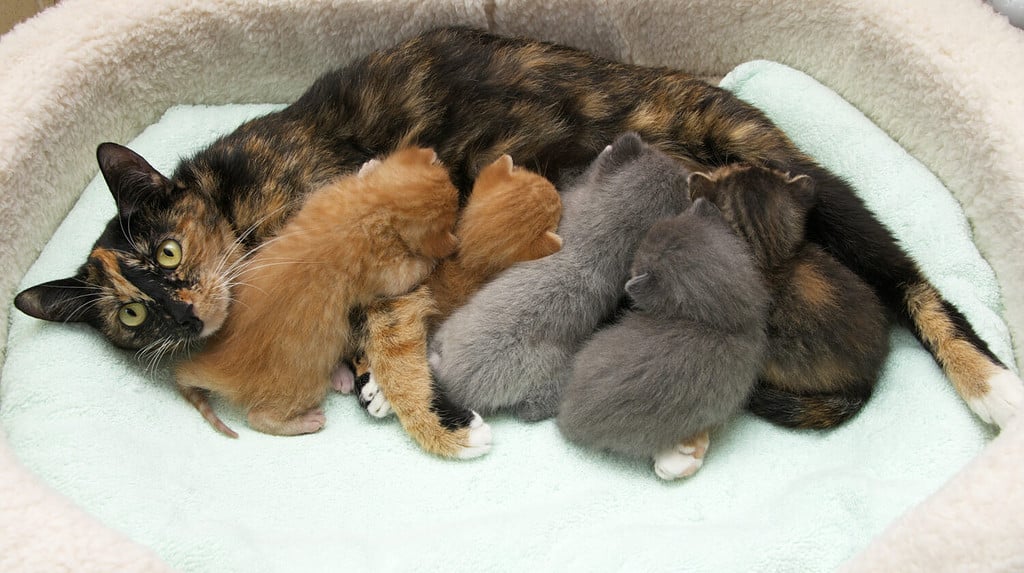
Only a veterinarian should determine if metronidazole is safe for your cat.
©iStock.com/Tomwang112
Metronidazole is an antibiotic and antiparasitic medication used to treat infections in humans, dogs, horses, and our feline house pets. This medication is prohibited for use in food-producing animals (such as cows and pigs) by the Food and Drug Administration (FDA) in the United States.
Studies have shown that long-term use in mice leads to cancer. Though there is some debate regarding metronidazole causing cancer, this medication can be seriously dangerous for other reasons, as well. Therefore, it must only be used under direct instruction from a veterinarian (or a doctor for humans).
We gently remind anyone reading this article that giving medication of any kind to your pet requires a veterinarian’s advice and direction. This article does not replace veterinary advice. Failure to consult a veterinarian before giving medication to your cat could result in major side effects up to and including death.
Let’s discover the uses, side effects, dosage, and more of metronidazole in cats together!
What is Metronidazole Used for in Cats?
Metronidazole comes in many forms. They include capsules, tablets, liquid suspension, and injection. The world of animal medicine uses this drug primarily to treat diarrhea. However, there are few specific illnesses veterinarians treat cats for with metronidazole. Sometimes, veterinarians prescribe metronidazole for diarrhea without knowing the cause.
As an antibiotic, metronidazole is useful in treating infections caused by anaerobic bacteria (or bacteria that do not require oxygen to live). In humans, some uses of this medication are the treatment of some STDs, pelvic inflammatory disease, and dental abscesses. As an antiparasitic, metronidazole treats some parasites that cause diarrhea in cats.
Let’s learn about some common uses of metronidazole in cats!
Giardiasis
Pronounced gee-ARE-dee-ay-sis, this condition results in diarrhea. A microscopic parasite, Giardia duodenalis (or giardia, for short), infects the pet through fecal-to-mouth transmission. It can be transferred from cat to cat through mutual cleaning and shared litter boxes. Giardia survives weeks to months on surfaces outside the body, so it is very easy to spread. Found worldwide, giardiasis is a zoonotic illness. That means humans can catch it from animals and vice versa. Transmission is as simple as touching something contaminated and then getting the parasite in your mouth. For example, petting an infected cat and then eating a sandwich without washing your hands.
If your cat contracts giardia, metronidazole is usually the first line of treatment. It’s important to wash your hands after handling infected pets and any surfaces they have touched. Rarely, giardia becomes resistant to metronidazole. In such cases, veterinarians may prescribe ronidazole instead.
Veterinarians confirm giardiasis by testing a fecal (poop) sample. Sometimes, they must send the sample to a laboratory while others possess the ability to test for giardiasis in-house.

is a microscopic parasite that lives in the intestines of infected animals and humans.
©D. Kucharski K. Kucharska/Shutterstock.com
Tritrichomonas
Said like try-trick-o-MOAN-is, this is another fecal parasite common to cats. Caused by Tritrichomonas foetus (or tritrich, for short), this disease is a feline-specific intestinal parasite. That means humans cannot catch it from cats. However, cats certainly pass it to one another. This is especially true for young cats living in large populations (such as feral colonies) or multi-cat households. Severe diarrhea and weight loss characterize this disease.
One study discussed the effectiveness of metronidazole for the treatment of cats with tritrich, among other medications. The results varied among other research referenced in the study. Ronidazole appears more effective than metronidazole, but some cats require multiple rounds of treatment with different medications to clear the infection. The same study indicated that breeds such as Abyssinian, Siamese, Bengal, and Norwegian Forrest Cat are more susceptible to tritrich.
Pancreatitis
This condition occurs when an animal consumes large amounts of fat which then causes severe inflammation in the pancreas. The pancreas is a very important organ that humans, cats, and dogs all have. When it becomes inflamed, it causes bloody diarrhea along with abdominal (stomach area) pain. Many pets experiencing pancreatitis refuse to eat and become weak due to starvation and blood loss.
Pancreatitis nearly always requires hospitalization on intravenous fluids (fluids given directly into a vein) along with intravenous administration of metronidazole. Cats also receive medication to control nausea and pain. Some cats may require a nasogastric feeding tube. This is a small, rubber tube placed through the nose and down the throat into the stomach.
The prognosis for pancreatitis in cats is fair to grave depending on the severity of the condition. A fair prognosis indicates the cat has about a 50/50 chance of surviving and recovering while a grave prognosis points to a likelihood the cat will pass away.

Cats with pancreatitis need intravenous fluids and metronidazole.
©wimala namket/Shutterstock.com
Side Effects of Metronidazole in Cats
Metronidazole produces some common side effects in cats. However, more serious problems can occur. We will list some possible side effects below along with additional information about the most severe of them. Remember, if you think your cat is having a side effect of any medication, the best thing to do is call your veterinarian right away!
Possible side effects include:
- Vomiting
- Nausea
- Diarrhea
- Drooling/foaming at the mouth – due to the bitter taste and/or nausea
- Refusal to eat – Cats can suffer from hepatic lipidosis (fatty liver syndrome) after only 48 hours without food.
- Lethargy/lack of energy
- Blindness
- Dark or bloody urine – this can be a sign of kidney failure
- Weakness
- Vasculitis – Although a rare side effect, this condition affects the top layer of the skin and causes inflammation. Signs include hair loss, bruising, swelling, and rash.
- Neurological concerns – This is a serious side effect of metronidazole in cats. Symptoms include a lack of muscle control or coordination, tremors, seizures, vomiting, eye twitching, and weakness.
- Liver toxicity – Marked by jaundice (yellowing of the skin, whites of the eye, and gums), metronidazole can cause liver damage in cats. If caught early, it can usually be helped. However, if not treated immediately, the liver may shut down resulting in death.

Jaundice is a side effect of liver damage. If you notice yellowing of your cat’s skin, get them to the vet ASAP!
©Todorean-Gabriel/Shutterstock.com
When Should Cats Not Take Metronidazole?
Dr. Shelly Wyatt, a licensed Doctor of Veterinarian Medicine at Northwood Hills Animal Hospital, told AZ Animals, “Metronidazole should not be used in pregnant or lactating Queens, especially in the first trimester. Nor in neonates and in cases of severe renal or liver impairment. It should be used cautiously in cases of mild to moderate renal or liver disease. Also, it should be avoided if the pet is on Phenobarbital since it increases the metabolism of the drug. For neonates, the liver and kidneys are still developing and damage could occur along with severe dysbiosis.”
Neonates are newborn kittens. Dysbiosis is an imbalance of good bacteria and yeast within the digestive tract. Because these kittens are so young, they are still developing and are quite fragile. Any medication could disrupt their growth leading to severe problems up to and including death.
Medications Your Cat Cannot Take With Metronidazole
Certain drugs can make the side effects of metronidazole in cats worse. So, it’s really important to talk to your vet about all the medicines your cat is on before adding any new ones. This goes for over-the-counter drugs, supplements, and vitamins too. Let’s go over some medications and what issues they can cause when used with metronidazole in cats.
- Cimetidine – This medication treats stomach ulcers and acid reflux. When used in combination with metronidazole in cats, it can make metronidazole take longer to leave the body. This process is known as drug metabolism. When the metabolism of drugs is increased or decreased, severe side effects can occur.
- Phenobarbital – This seizure-prevention medication raises the metabolism rate of metronidazole in cats. That means it makes the body process metronidazole more quickly. This could make the metronidazole ineffective or increase the chances of side effects.
- Cyclosporine – On the other side of the coin, metronidazole increases the metabolism of cyclosporine in cats. That results in a higher risk of side effects from the cyclosporine.
- Phenytoin – This anti-seizure drug can also be affected by metronidazole in cats. Metronidazole reduces the metabolism of phenytoin while the opposite is true, as well. That is, phenytoin increases the body’s processing of metronidazole. These effects can cause metronidazole not to work and heighten the risk of side effects with phenytoin. Phenytoin side effects include stumbling, weakness, lethargy, and low platelet counts (which can lead to internal bleeding).
- Warfarin – This anticoagulant medication (one that prevents blood clots) is rarely used in cats. However, combining with metronidazole can increase the risk of internal bleeding and prevent blood clotting in the case of cuts, scrapes, and other wounds.

Pregnant or nursing cats should never take metronidazole as it can cause birth defects and harm young kittens.
©Sheila Fitzgerald/Shutterstock.com
Conditions That Prevent Your Cat From Taking Metronidazole
As Dr. Wyatt stated, there are several conditions that reduce her ability to prescribe metronidazole to cats. We’ll list them below. This list should not be considered complete. Again, always talk to your veterinarian before using metronidazole for your cat.
- Pregnancy – Metronidazole crosses into the uterus (where kittens grow) and can cause damage to unborn kittens. This may result in life-threatening birth defects.
- Nursing Mothers – It should also be avoided in cats who are nursing kittens as the medication can contaminate the milk.
- Younger than six weeks old – Though age is not a medical condition, it sometimes prevents the use of certain medications. As Dr. Wyatt stated, giving metronidazole to young kittens can severely damage their liver and kidneys.
- Liver or Kidney Disease – If a cat already has liver or kidney disease, they may be unable to process metronidazole efficiently. This could lead to some of the more serious side effects we’ve discussed.
Final Thoughts on Metronidazole for Cats
As always, owners should never give a cat any medication without first discussing it with their veterinarian. Metronidazole is a useful drug when given properly for diseases such as giardia in cats. Nevertheless, metronidazole can be incredibly toxic to cats even at the directed dose. If your cat requires metronidazole, ensure to wash your hands after administering it. Also, watch closely for any signs of side effects and call your vet right away if you notice these.
The photo featured at the top of this post is © Svetlana Rey/Shutterstock.com
Thank you for reading! Have some feedback for us? Contact the AZ Animals editorial team.






